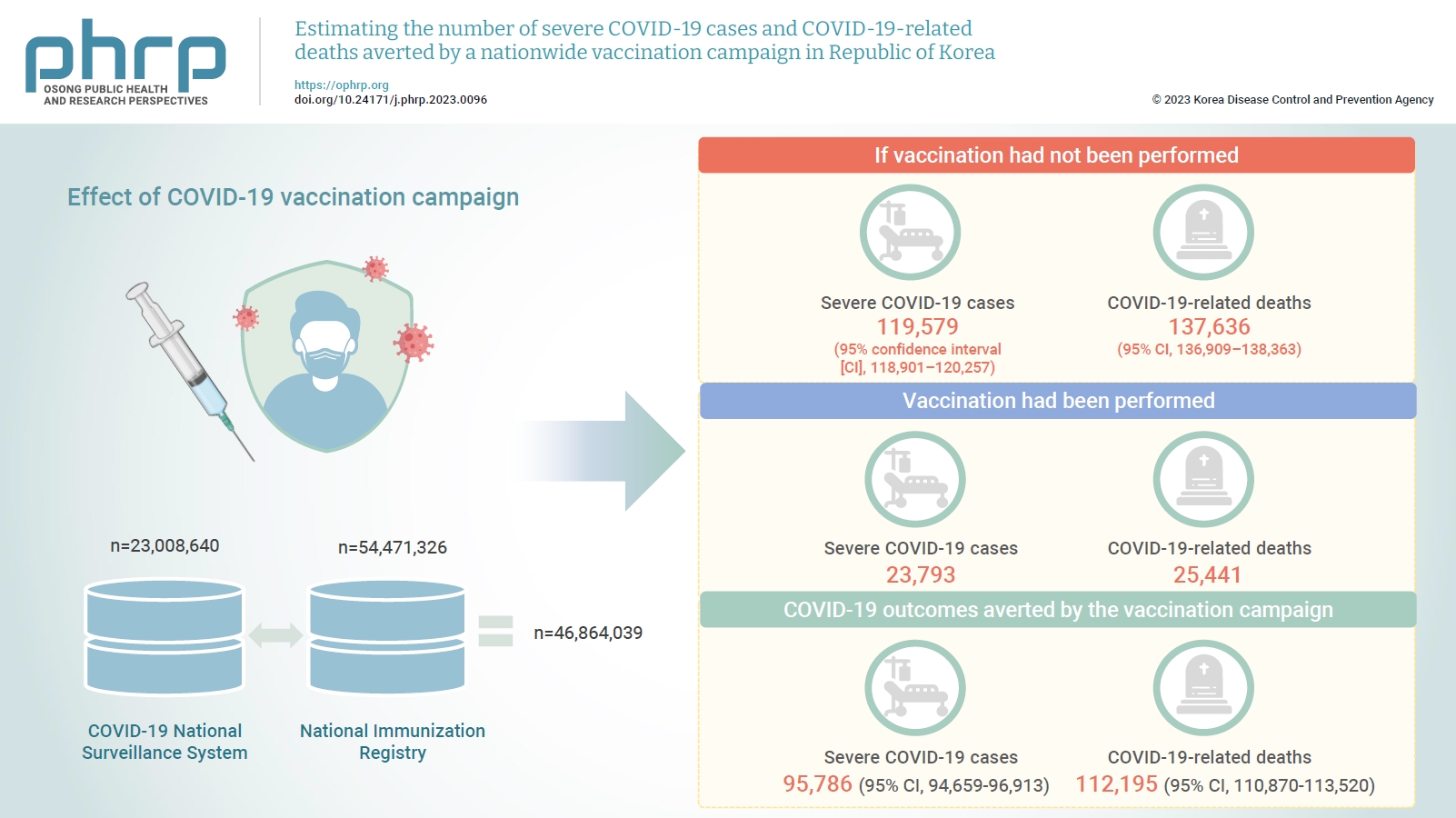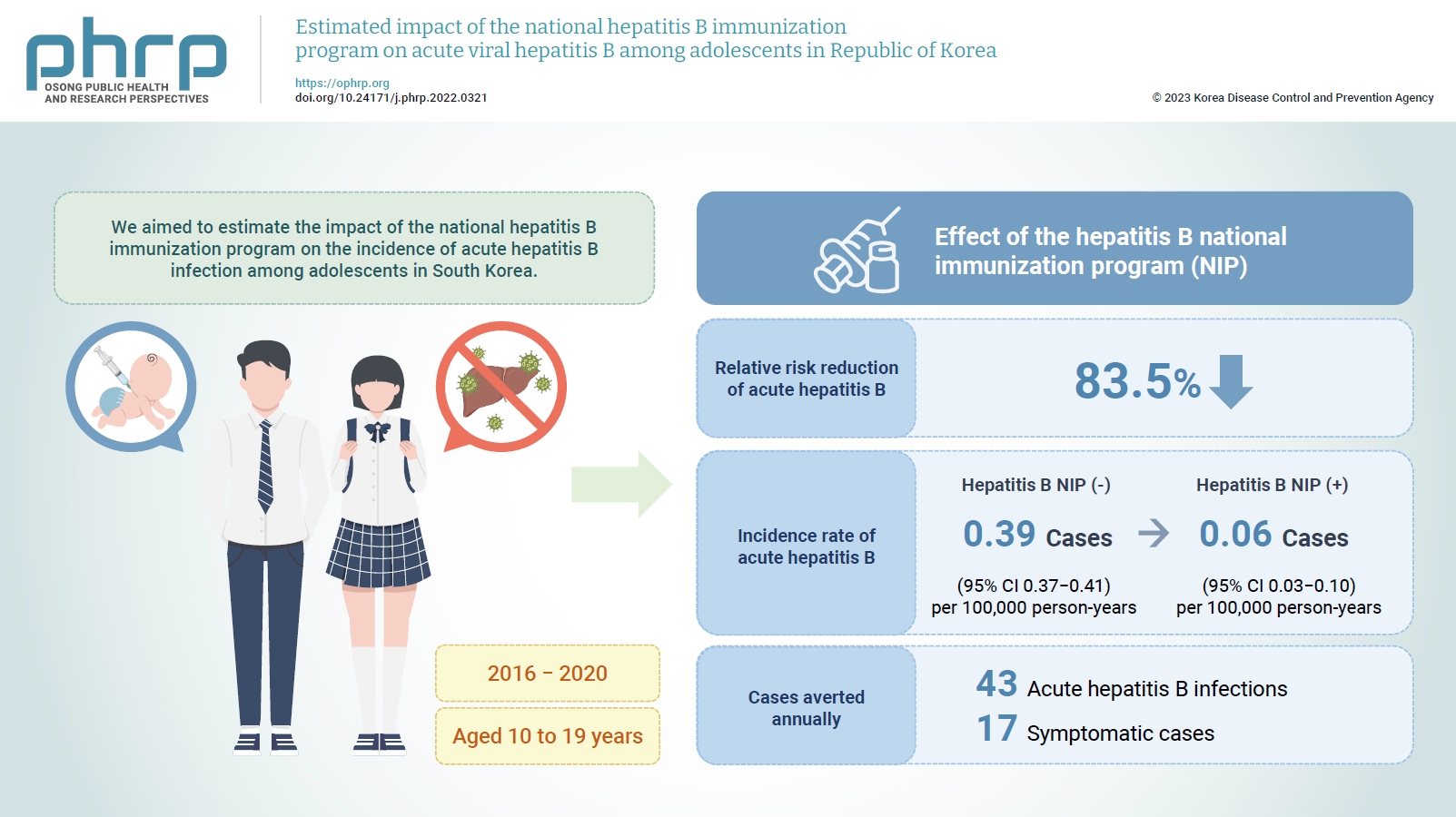Search
- Page Path
- HOME > Search
Original Articles
- Estimating the number of severe COVID-19 cases and COVID-19-related deaths averted by a nationwide vaccination campaign in Republic of Korea
- Ji Hae Hwang, Ju Hee Lee, Eun Jung Jang, Ryu Kyung Kim, Kil Hun Lee, Seon Kyeong Park, Sang Eun Lee, Chungman Chae, Sangwon Lee, Young Joon Park
- Osong Public Health Res Perspect. 2023;14(3):164-172. Published online June 22, 2023
- DOI: https://doi.org/10.24171/j.phrp.2023.0096
- 1,736 View
- 117 Download
- 1 Web of Science
- 1 Crossref
-
 Graphical Abstract
Graphical Abstract
 Abstract
Abstract
 PDF
PDF 
- Objectives
The Korea Disease Control and Prevention Agency promotes vaccination by regularly providing information on its benefits for reducing the severity of coronavirus disease 2019 (COVID-19). This study aimed to analyze the number of averted severe COVID-19 cases and COVID-19-related deaths by age group and quantify the impact of Republic of Korea’s nationwide vaccination campaign.
Methods
We analyzed an integrated database from the beginning of the vaccination campaign on February 26, 2021 to October 15, 2022. We estimated the cumulative number of severe cases and COVID-19-related deaths over time by comparing observed and estimated cases among unvaccinated and vaccinated groups using statistical modeling. We compared daily age-adjusted rates of severe cases and deaths in the unvaccinated group to those in the vaccinated group and calculated the susceptible population and proportion of vaccinated people by age.
Results
There were 23,793 severe cases and 25,441 deaths related to COVID-19. We estimated that 119,579 (95% confidence interval [CI], 118,901–120,257) severe COVID-19 cases and 137,636 (95% CI, 136,909–138,363) COVID-19-related deaths would have occurred if vaccination had not been performed. Therefore, 95,786 (95% CI, 94,659–96,913) severe cases and 112,195 (95% CI, 110,870–113,520) deaths were prevented as a result of the vaccination campaign.
Conclusion
We found that, if the nationwide COVID-19 vaccination campaign had not been implemented, the number of severe cases and deaths would have been at least 4 times higher. These findings suggest that Republic of Korea’s nationwide vaccination campaign reduced the number of severe cases and COVID-19 deaths. -
Citations
Citations to this article as recorded by- Comparative Effectiveness of COVID-19 Bivalent Versus Monovalent mRNA Vaccines in the Early Stage of Bivalent Vaccination in Korea: October 2022 to January 2023
Ryu Kyung Kim, Young June Choe, Eun Jung Jang, Chungman Chae, Ji Hae Hwang, Kil Hun Lee, Ji Ae Shim, Geun-Yong Kwon, Jae Young Lee, Young-Joon Park, Sang Won Lee, Donghyok Kwon
Journal of Korean Medical Science.2023;[Epub] CrossRef
- Comparative Effectiveness of COVID-19 Bivalent Versus Monovalent mRNA Vaccines in the Early Stage of Bivalent Vaccination in Korea: October 2022 to January 2023
- Estimated impact of the national hepatitis B immunization program on acute viral hepatitis B among adolescents in Republic of Korea
- Chungman Chae, Sangwoo Tak
- Osong Public Health Res Perspect. 2023;14(2):138-145. Published online March 24, 2023
- DOI: https://doi.org/10.24171/j.phrp.2022.0321
- 1,540 View
- 62 Download
-
 Graphical Abstract
Graphical Abstract
 Abstract
Abstract
 PDF
PDF 
- Objectives
We aimed to estimate the impact of the national hepatitis B immunization program on the incidence of acute hepatitis B infection among adolescents in South Korea.
Methods
We estimated the counterfactual incidence rate of reported acute hepatitis B among adolescents from 2016 to 2020 compared to the assumption that the national hepatitis B immunization program for children had not been implemented since 1995. The impact of the national hepatitis B immunization program for adolescents was measured by estimating the absolute risk reduction and averted acute hepatitis B infections among adolescents from 2016 to 2020 attributed to the national immunization program.
Results
The relative risk reduction of acute hepatitis B among adolescents was estimated to be 83.5% after implementing the national hepatitis B immunization program. The incidence rate of reported acute hepatitis B infections among adolescents decreased from 0.39 to 0.06 per 100,000 person-years, and 43 acute hepatitis B infections, including 17 symptomatic cases, were averted annually from 2016 to 2020 by the national hepatitis B immunization program.
Conclusion
The national hepatitis B immunization program for children was effective in preventing acute hepatitis B infection among adolescents in South Korea.



 First
First Prev
Prev


